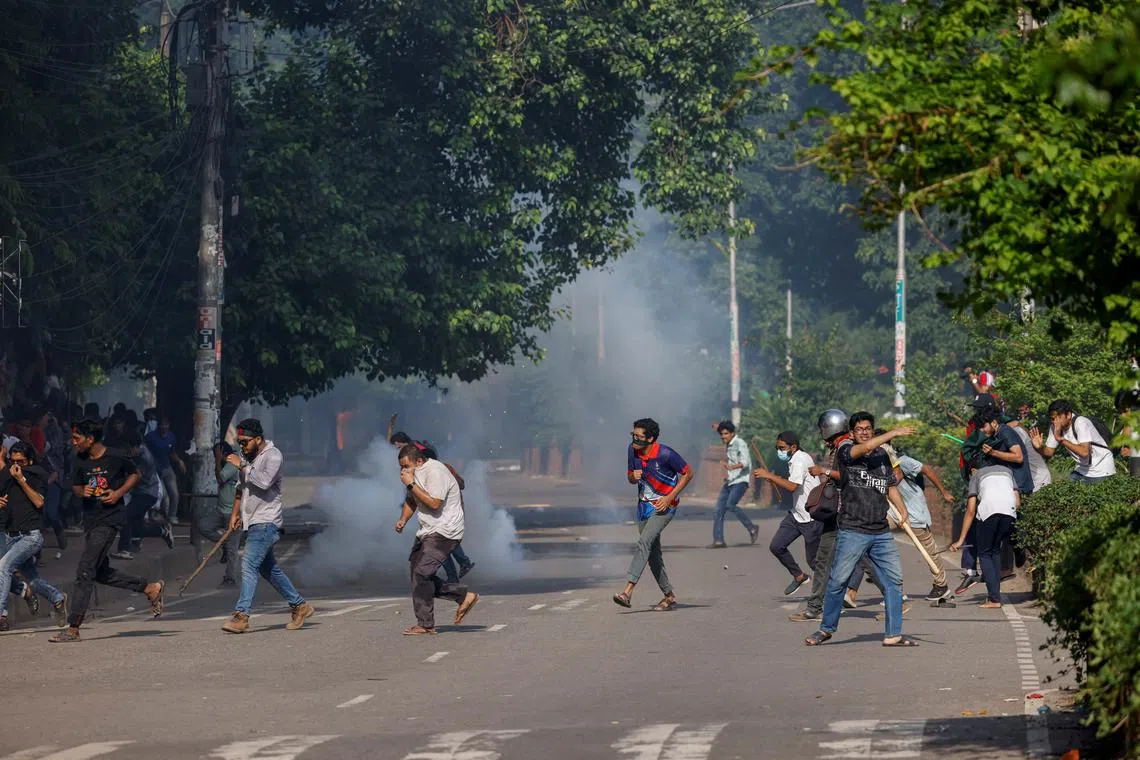Bangladesh protesters set fire to state TV station; at least 32 killed in nationwide clashes
Sign up now: Get insights on Asia's fast-moving developments

People dispersing as police fired tear gas during a rally against job quotas at the University of Dhaka in Bangladesh on July 17.
PHOTO: REUTERS
DHAKA - Bangladeshi students set fire to the country’s state television station on July 18, a day after Prime Minister Sheikh Hasina appeared on the network seeking to calm escalating clashes that have killed at least 32 people.
Hundreds of protesters demanding the reform of civil service hiring rules fought back.
They overwhelmed riot police who had fired at them with rubber bullets and chased the retreating officers, who fled to BTV’s headquarters in the capital Dhaka.
The incensed crowd then set ablaze the network’s reception building and dozens of vehicles parked outside, a BTV official told AFP on condition of anonymity.
“Many people are trapped inside,” the broadcaster said on its Facebook page, adding that the “catastrophic fire” was spreading quickly.
Ms Hasina’s government has ordered schools and universities to close indefinitely as police step up efforts to bring the country’s deteriorating law and order situation under control.
The Premier appeared on the network on the night of July 17 to condemn the “murder” of protesters, and vowed that those responsible will be punished regardless of their political affiliation.
But violence worsened on the streets despite her appeal for calm as the police again attempted to break up demonstrations with rubber bullets and tear gas volleys.
The death toll reached 32 on the night of July 18, according to an AFP count of victims from hospitals around the country.
Fresh clashes broke out in several cities across Bangladesh throughout the day as riot police marched on protesters, who began another round of human blockades on roads and highways.
Helicopters rescued 60 police officers who were trapped on the roof of a campus building at Canadian University, the scene of some of Dhaka’s fiercest clashes on July 18, the elite Rapid Action Battalion police force said in a statement.
Three students and a rickshaw driver were brought dead to one hospital in the capital.
“They all had rubber bullet injuries,” Kuwait Moitri Hospital assistant superintendent Mahfuz Ara Begum told AFP.
“More than 150 students are also being treated here. Most were hit by rubber bullets in their eyes.”
The country also reported widespread mobile internet outages on July 18, two days after internet providers cut off access to Facebook – the protest campaign’s key organising platform.
Near-daily marches in July have demanded an end to a quota system that reserves more than half of civil service posts for specific groups, including children of veterans from the country’s 1971 liberation war against Pakistan.
Critics say the scheme benefits children of pro-government groups that back Ms Hasina, 76, who has ruled the country since 2009 and won her fourth consecutive election in January after a vote without genuine opposition.
The demonstrations started in June after the High Court reinstated the quota system for government jobs, overturning a 2018 decision by Ms Hasina’s government that had caved in to pressure from mass student protests to scrap it.
But the Supreme Court suspended the High Court order after the government’s appeal, setting a date of Aug 7 to hear the government’s challenge. AFP, REUTERS


